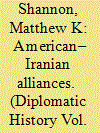| Srl | Item |
| 1 |
ID:
140746


|
|
|
|
|
| Summary/Abstract |
The tension between “modernization” and “rights” defined the relationship between Americans and Iranians from the 1950s through the 1970s. The dynamic interplay between these two transnational currents is best understood through the lens of international education. U.S. policy makers envisaged Western-educated Iranians as the bastion of pro-Americanism required to provide the cultural underpinnings of the Washington–Tehran alliance. But the influx of Iranian students to American campuses globalized U.S. institutions of higher education and, in the process, produced an alternate alliance of Iranian youths and progressive Americans that rejected Shah Mohammad Reza Pahlavi’s authoritarian model of development, called for the realization of human rights in Iran, and revealed the contradictions inherent in a U.S. strategy that promoted student exchange while at the same time supporting the shah as an agent of modernization and anti-Communism.
|
|
|
|
|
|
|
|
|
|
|
|
|
|
|
|
| 2 |
ID:
157846


|
|
|
|
|
| Summary/Abstract |
Despite the nature of American influence in postwar Iran, and despite the fact that Iranian studies has grown into a flourishing field in the United States, scholars have not explored the field's origins during the Cold War era. This article begins with the life of T. Cuyler Young to trace the critical genealogy within the field as it developed, in cooperation between American and Iranian scholars, during the reign of Mohammad Reza Shah Pahlavi. It proceeds to analyze two cohorts of American scholars whose political inclinations ranged from liberal reformism to revolutionary Marxism. As revolutionary momentum swelled in Iran in the late 1970s, critical scholars broke through superpower dogmas and envisioned a post-shah Iran. However, Cold War teleologies prevented them from fully grasping Iranian realities, particularly Khomeini's vision for Iran. This article argues that the modern field of Iranian studies in the United States was shaped by multiple generations of critical voices, all of which were informed by historically situated encounters with Iran and expressed through a range of methodological and theoretical perspectives.
|
|
|
|
|
|
|
|
|
|
|
|
|
|
|
|